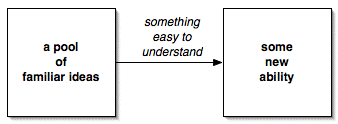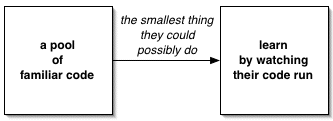
 The keynote address for this year's
Educators' Symposium
was given by
Ward Cunningham,
one of the software folks I admire most. Of course, he's
admired by many folks, including not surprisingly by the
folks who organized the
Wiki Symposium
launched by and collocated with OOPSLA this year. As a
result, Ward's keynote to our group had to be moved from
its traditional first slot of the day to the slot immediately
after lunch. This gave the keynote a different feel, because
we all had a
morning's worth of activities
in which to hear Ward's words. (You can read a
summary
of Ward's Wiki Symposium keynote, titled "The Crucible of
Creativity".)
I introduced Ward by telling the audience how I first
encountered his work. At AAAI 1995 in Montreal, I was
discussing some of my ideas on teaching elementary patterns
with a colleague from Wales. He said, "I have a book for
you to review..." You see, he was one of the editors of
the journal
Expert Systems,
and he had received a book for review that he didn't know
what to do with. It was about software patterns, and he
figured that I'd be an okay reviewer. He was probably
encouraged to think this by the fact that none of his other
AI friends seemed to be interested.
The book was
Pattern Languages of Program Design,
and it changed my life. I had never been exposed to the
nascent software patterns community, and this book
introduced me to a lot of ideas and, ultimately, people
who have played an important role in my academic work since.
One of the papers in PLoPD-1 affected me immediately. It
was about the
CHECKS pattern language,
and it was written by Ward Cunningham. These patterns were
so simple, so obvious, yet as I read them I learned something
about maintaining the integrity of the data in my programs.
As I looked for more of Ward's work, I soon learned that
what attracted me to CHECKS was a hallmark of Ward's: the
ability to recognize simple ideas that offered unexpected
depth and to explore that depth, patiently and humbly. So
many of Ward's contributions to standard practice have been
the result of a similar process: CRC cards, patterns, wiki,
extreme programming, test-first design, and FIT among them.
I asked Ward to keynote the Educators Symposium because I
admired his work but because I hoped that he could teach
us educators -- especially me -- a little bit of his secret
gift. Maybe I could nurture the gift in myself, and maybe
even pass on something to my students.
Ward opened his talk with a reminiscence, too. As an
electrical engineering major in college, he learned about
Maxwell's equations from a Professor Simpson. The professor
taught the equations with passion, and he expected his
students to appreciate their beauty. Much of their beauty
lay in their simplicity, in how that brought so many important
facets together into such a small number of straightforward
equations. Professor Simpson also loved the work of Richard
Feynman, who himself appreciated simplicity and wrote with
humanity about what he learned.
One of Ward's first slides was The Big Slide, the take-home
point of his talk. He characterized his way of working as:
The keynote address for this year's
Educators' Symposium
was given by
Ward Cunningham,
one of the software folks I admire most. Of course, he's
admired by many folks, including not surprisingly by the
folks who organized the
Wiki Symposium
launched by and collocated with OOPSLA this year. As a
result, Ward's keynote to our group had to be moved from
its traditional first slot of the day to the slot immediately
after lunch. This gave the keynote a different feel, because
we all had a
morning's worth of activities
in which to hear Ward's words. (You can read a
summary
of Ward's Wiki Symposium keynote, titled "The Crucible of
Creativity".)
I introduced Ward by telling the audience how I first
encountered his work. At AAAI 1995 in Montreal, I was
discussing some of my ideas on teaching elementary patterns
with a colleague from Wales. He said, "I have a book for
you to review..." You see, he was one of the editors of
the journal
Expert Systems,
and he had received a book for review that he didn't know
what to do with. It was about software patterns, and he
figured that I'd be an okay reviewer. He was probably
encouraged to think this by the fact that none of his other
AI friends seemed to be interested.
The book was
Pattern Languages of Program Design,
and it changed my life. I had never been exposed to the
nascent software patterns community, and this book
introduced me to a lot of ideas and, ultimately, people
who have played an important role in my academic work since.
One of the papers in PLoPD-1 affected me immediately. It
was about the
CHECKS pattern language,
and it was written by Ward Cunningham. These patterns were
so simple, so obvious, yet as I read them I learned something
about maintaining the integrity of the data in my programs.
As I looked for more of Ward's work, I soon learned that
what attracted me to CHECKS was a hallmark of Ward's: the
ability to recognize simple ideas that offered unexpected
depth and to explore that depth, patiently and humbly. So
many of Ward's contributions to standard practice have been
the result of a similar process: CRC cards, patterns, wiki,
extreme programming, test-first design, and FIT among them.
I asked Ward to keynote the Educators Symposium because I
admired his work but because I hoped that he could teach
us educators -- especially me -- a little bit of his secret
gift. Maybe I could nurture the gift in myself, and maybe
even pass on something to my students.
Ward opened his talk with a reminiscence, too. As an
electrical engineering major in college, he learned about
Maxwell's equations from a Professor Simpson. The professor
taught the equations with passion, and he expected his
students to appreciate their beauty. Much of their beauty
lay in their simplicity, in how that brought so many important
facets together into such a small number of straightforward
equations. Professor Simpson also loved the work of Richard
Feynman, who himself appreciated simplicity and wrote with
humanity about what he learned.
One of Ward's first slides was The Big Slide, the take-home
point of his talk. He characterized his way of working as:


From the audience, Joe Bergin pointed out his personal favorite variant of this wisdom (which, I think, ironically turns Ward's advice back on itself): Take a good idea and do it to the hilt. This is, of course, how Kent Beck initially described XP -- "Turn the knobs up to 10."